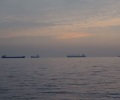Producing the personnel needed for shipping to grow

The shipping sector in Cyprus has long been a cornerstone of the economy and now it is booming, with Cypriot education finally waking up to it.
A deputy shipping ministry was established just last year, an acknowledgement of the growing importance of the sector but it has become clear in recent years that the Cyprus shipping industry is in need of graduates ready to work in the industry, advisor to the deputy minister Andreas Karamitas told the Cyprus Mail.
“There is an awareness in Cypriot society that personnel is needed,” he said. The ministry is supporting the sector in any way it can, he added. “We give them [educational institutes] money from our budget, and empower people. For example, on October 9 the biggest international maritime exhibition will take place in Cyprus.”
There have been many more shipping companies registered in Cyprus in the past few years, and more employees are needed, but Cypriots have been slow to respond added, associate director of the Larnaca-based Cyprus Maritime Academy Kyriakos Patsalides.
“Cypriots did not have it in mind, potential students were not informed about this field. Everybody was thinking about oil and gas but these foreign companies actually did not employ any locals yet, they bring their own personnel with expertise,” he said.
Shipping companies on the contrary need people and the private and public sector are now aware of it, with secondary and tertiary educational institutions offering different types of related subjects.
In Limassol, often dubbed ‘the maritime capital’ of Cyprus, public technical schools offer courses on the subject, and more is on offer in private higher education institutes.
There are basically two ways to go about getting a maritime education in higher education.
One is provided for by the Cyprus Institute of Marketing (CIM) and Frederick University, a programme that is geared to lead to managerial positions in the shipping industry and which is offered in Limassol.
The other path, offered by the Cyprus Maritime Academy, is more practical and leads to jobs on ships rather than in offices.
The CIM has a long tradition and started a programme in shipping administration in the 80s, but the syllabus has since been totally revamped. According to deputy director of the institute Yangos Hadjiannis it is a massive success and has actually made the Limassol campus more successful than the Nicosia one.
“All the shipping companies are in Limassol,” he said, “and we are partners with the big companies such as Columbia.” This, he believes, is of tremendous importance, as the firms have gotten to value the tertiary education institute and are willing to offer jobs to the graduates. “There is an almost 100 per cent employability,” he explained.
The first MBA course started in 2015, after a consultation with companies to determine what they were looking for.
It is mainly for those with a different first degree who need to divert in order to find a job and those who already have a job and want to expand their knowledge. “Half are already professionals in the industry. All our classes are in the evening to accommodate them. The companies they work for often pay for them.”
Things have changed over the past years, Hadjiannis believes. After the economic crisis, more students and their parents are interested in employment, while before many students studied what they liked, something which parents supported.
Another change the crisis has brought is a willingness to be more flexible when it comes to which town the young people study in. “It was practically unheard of for students from Larnaca and Nicosia to study in Limassol, and this has changed.”
Where locals are still conservative, he thinks, is when it comes to technical programmes. Students would still rather study management and aim for a job in an office than work on a ship which is seen by many as a last resort.
Patsalides of the Cyprus Maritime Academy, which offers a much more technical-oriented programme, sees changes in these attitudes and says that as long as students understand that the goal of the programme is to get a job on a ship people are interested, and most are willing to complete the training, which includes time at sea. “The goal is one: to start working on a ship. Working in an office is not a choice,” he said. Well, at least not for some time. Only after five to eight years experience will a company offer the employees a managerial position. “They need to understand that companies are looking for really experienced personnel to work in their offices.”
The Cyprus Maritime Academy was launched by Intercollege under the umbrella of the University of Nicosia in 2016 to encourage more people into the booming shipping industry. It is unique in its approach, making the most of the input from the industry, while offering not only a Bachelor degree but also a secure and well-paid job at the end of the four-year course.
Of the 50 students who start the programme about 10 will drop out, either for financial reasons or because they haven’t understood the part about working on a ship. The experience on board is for many the hardest part of the course so the Academy has timetabled the first two-month stint on board after the first year as a filtering process. Together with their academic performance, this ensures that only those who are up to it go on to the second year. According to Patsalides, it is necessary so the students get to know what their job will be like.
Because of this, industries are not willing to invest before the cadets start their second year. From then on, however, students can apply to receive 65 per cent of their tuition, around €18,000. As the ships where students are trained are usually not docked in Limassol but may be anywhere in the world, the student’s fare to the vessel is also paid for. Last but not least, they also have a job after the successful completion of their studies. The cadets are required to work on board one of the ‘adopting’ company’s ships for a period of three years.
During this time, a small amount will be deducted from their pay on a monthly basis, which will go towards the repayment of the financial support provided to them during their studies. The job security is something that attracts the students. Unlike students at public institutions in Greece, where graduates have to find companies willing to employ them, the Larnaca academy brings the industry in contact with the students during their studies.
Both the CIM and the Maritime Academy acknowledge working in the shipping industry can be a dream job, but there may be drawbacks for those not suited to the work.
“These are professions than can assure the future of any young person with high rewards, with the possibility to visit many places and meet different cultures and people, but they are for people with a strong will and character to manage the challenges of this unique industry,” executive director of the Cyprus Maritime Academy Stelios Mavromoustakos said.
“It is not for everyone. It is easy to get a job and can be exciting with a lot of travelling,” CIM’s Yangos Hadjiannas added. “It is not a typical Cypriot office job, it usually involves working with people from other nationalities”.
What programmes are available to study
Maritime Academy in Cyprus which is under Intercollege Larnaca offers two programmes which last for four years, including one-year training on board a ship. After the initial two-month internship another two, each five months long, follow in years 2 and 4.
The first course on offer is the Nautical Science programme aimed at training officers on merchant ships. The deck’s department officers are responsible for the navigation, manoeuvring and safe handling of the ship, communications between ship and shore, the handling and delivery of cargo, and the operation of lifesaving devices.
Upon completion of the study in Marine Engineering, the second course offered, graduates can get jobs as engine officers. These officers, under the orders of the chief engineer, are responsible for the proper running, maintenance and repair, where needed, of the mechanical and electrical installations of the ship.
In addition to these programmes, the hospitality students who study at Intercollege Larnaca can complete their internship on a ship instead of at a hotel. For this they receive compensation and after their studies are qualified to work in hospitality-related jobs on cruise ships as well as in hotels.
The four-year Bachelors in Shipping Management at the CIM aims to develop the intellectual skills necessary in international shipping and teaches subjects aimed at understanding the organisation and structure of sea transport and grasping the importance of economic practices.
The Cyprus Institute of Marketing also offers a Masters in Business Administration with Shipping, which can be completed in 12 months (full-time) or in 24 months (part time). The MBA considers trading patterns and shipping organisation in their legal, financial and managerial context.
Frederick University offers both competency and academic programmes.
The BSc is the oldest, most established and the most grounded, Sotiris Jeropoulos, programme coordinator of the BSc of Maritime Studies said, “simply because we have had time to improve.” It has started before the year 2000.
There are also three postgraduate programmes at the Limassol campus of the university, the MSc in International Trades and Shipping Management, MA/LLM in Maritime Law and Shipping Business and MSc in Marine Engineering and Management.
Apart from those, Frederick also has two competency programmes, which fill in some academic gaps but where students also spend six months on a ship to carry out specific tasks on board.
The Engineer of the Watch programme is the only one of its kind and bridges the gap from mechanical engineering to marine engineering, while there is also a Second Engineer and Chief Engineer professional competency programme, which brings students from a basic engineer level to higher levels.
All programmes are accredited locally and internationally.
Source: Cyprus Mail

 Hellenic Shipping News Worldwide Hellenic Shipping News Worldwide, Online Daily Newspaper on Hellenic and International Shipping
Hellenic Shipping News Worldwide Hellenic Shipping News Worldwide, Online Daily Newspaper on Hellenic and International Shipping























 PG-Software
PG-Software